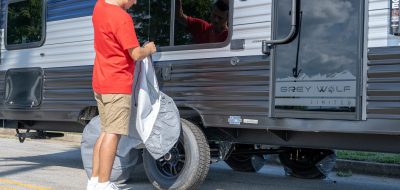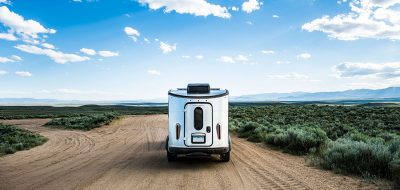My Top 10 RV Safety Reminders…
Safety is always an important subject with RV’ing whether you full-time or just travel occasionally. One needs to be conscious of the many items that need to be checked and maintained. This not only provides for safe traveling and a fun RV experience, but can also save you money in the long run avoiding costly and unnecessary repairs. Taking a little time to check these and other things can go a long ways in making your RV life enjoyable and give you peace of mind…
1. Emergency exits.
Since we seldom ever use or open these it’s a good idea to “exercise” them occasionally so they don’t become hard or impossible to open. It also keeps us all familiar with their operation. I hadn’t done this and darn near couldn’t get one open due to time and mild corrosion. In the many seminars I’ve done at rallies and events since I have gone around and asked people to show me how their emergency exits worked. I’ve been shocked at how many had no idea and fought with them for several minutes before I simply reached over and opened it for them!
2. Safety Alarms
Check all Smoke, LPG and Carbon Monoxide alarms for proper operation and replace batteries as needed. These as I saw time and time again during my career are life savers. You may never have one go off, but if you have one you want it to work and do its job. They are for our own safety, but like anything require maintenance in order to properly perform their job. Most LPG detectors are only good for about 5 years or so as I found out first hand. if you start having problems with yours then it probably needs replacing. (also see battery section below)
3. House Batteries.
Check to insure proper fluid levels so the batteries do the assigned job. Keep the terminals clean. Look for signs of “battery swelling” where the sides seem to look as if they are bulging out. This can be a sign of overcharging and imminent battery explosion or failure which also can lead to some very dangerous fumes as well. Remember that low battery voltage can cause your LPG detector to go off leading you to think you have a LPG leak. This can be very frustrating. Improper maintenance of batteries can lead to all kinds of problems. Batteries has been one of the most neglected items I’ve seen. In every seminar I’ve given at rallies this has been the most common denominator. Almost in every incident it (lack of maintenance) required avoidable and expensive replacement of batteries. one person thought he had maintenance fee batteries because his coach battery was maintenance free. A $450 mistake!
4. Tires.
Check your tires periodically for signs of unusual wear, sidewall cracking and insure regularly they are inflated to the proper pressure. Under inflation besides defects is the #1 cause for sidewall cracking resulting in tire failure. RV’s in storage should be checked regularly as well. Sitting long periods the pressure will drop and if not tended to will definitely result in sidewall cracking and damage. This weakens the tires extensively. Age of tires also plays a big role. Just because a tire()s) looks in great shape age can play a big factor in failure even though they may look fine. Some say the general rule is to replace them every 6 or 7 years. The exception to this is of course the larger truck tires that come on your larger Class A type motor homes. They are a bit heavier made than the trailer type tires. When in doubt have a reputable tire dealer look and check your tires regarding the age issue.
5. Wheel Lug Nuts.
Periodically check the lug nuts on your RV’s wheels. They are to be tightened to a predesignated amount (torque). I use a torque wrench to achieve this. The specs on what they are to be tightened can usually be found in your owner’s manual and if not call your dealer. There is nothing worse than a wheel/tire coming off because of loose lug nuts. The damage from such can lead to expensive repairs and not to mention accidents and possible injury or even death tro someone. Also look for any possible stress cracks in the wheels themselves. While rare this has been known to be a problem on occasion and should not be discounted.
6. Outside vent compartments.
I refer here to such things like the outside compartments for your water heater, refrigerator, heater and others. Keep these areas clean! Not only will it provide for proper operation of you appliance it reduces fire hazards. Many times wasps and other critters will homestead in these areas and can cause many problems. RV’s in storage once again are even more subject to this. Vents, and other functions can be plugged from such resulting in improper or no operation of things at all. Keep these areas clean! You and your RV will be much happier!
7. Exterior inspection.
Look for signs of soot especially around the water heater compartment. This is an indicator of improper combustion and can lead to many problems and even fires. If you see this get the unit inspected and repaired/adjusted as necessary! Look for cracks and other defects as well. A good visual inspection occasionally can save you a lot of time, money and grief.
8. Roof, especially rubber/EPDM types.
Periodically inspect your roof. Keep it clean with proper cleaning methods. One very important thing to look for is any small tears. Many times people drive under trees thinking they’ve cleared just fine and resulted in a limb causing a small tear. Water is your worst enemy here and can cause tremendous damage. I fell prey to this once, but got nervous upon reaching my destination and upon inspection I in fact found a small tear. I fixed it with an Eternabond patch less than 24 hours before a big rain storm. Had I not caught this the results would have been disastrous, not to mention very costly!
9. Undercarriage.
Inspect framework and especially the shackles, springs and associated items. Should any of these fail it could lead to a bad accident. Look for cracks, missing bolts/nuts, severe corrosion and address any issue you find in a timely manner. Many times while traveling as well all know we run across road hazards and some can cause very significant damage which could lead to an unfortunate accident or an expensive repair job if it goes unnoticed and unattended. Also insure you maintain your wheel bearings. Depending on the type you have insure they are either repacked or lubed annually or as needed. I can’t count the incidents I’ve been on where fires resulted in over heated wheel bearings and other damage due to improper maintenance.
10. LPG lines and tanks and fittings.
Check all your LPG lines for excessive rust and corrosion which can lead to leaks. No matter how small of a leak it is can lead to a fire and very disastrous situation, not to mention losing your all propane. Insure all fittings at your tank are tight and the tanks are securely held in place. Exercise your auto change over valve often to insure proper operation and keeping the diaphragm “exercised”. Look for excessive corrosion on your tanks and address as needed. Also look for any possible damage that might have occurred.
*** Remember you RV will not maintain itself. Over my 33 year career as a fire captain many times incidents I responded to were due to lack of maintenance and such. As a camp host of 6 years I’ve seen even more. Some of the things I see literally scare me to the point I may bring it to someone’s attention. I have on several occasions pointed out stress crack in RV’s that the owner was totally unaware of and had they not been addressed would have led to some serious damages. Treat your RV well and it will treat you well. Abuse it and it will abuse you so place yours and others safety foremost. There are many more items to check and maintain. This is only my top 10 list. I’ve learned the hard way on some things and it’s not fun and costly. It’s all called preventive maintenance. That’s why the 20 year old fire trucks you see look and run like they are new! Feel free to add your own here as I can’t stress safety enough. I could tell you horror stories from my career regarding RV fires and accidents with many preventable with simple periodic safety checks and proper maintenance. All of this can be easily done in one day in an hour’s time or spread out and easily done in short intervals. I keep all my inspection and maintenance records in my RV Notebook for reference as well as a reminder. Make a list and set yourself up an inspection schedule. A little time will save you a lot of money. Don’t sell yourself short on safety! It’s good peace of mind.
Tony Cornett (aka Firedude)






Pingback: how to make a website
Tony Cornett
A.W.
I actually had a fit with mine once and made me a believer to checkout the emergency exists. You’re right it’s a long ways down from the bedroom in a 5’er! I’m 6’4″ 260 pounds, but I’ll get myself out tyhat window if I have to! It’s amazing what you can do when the adrenalin hits as I found out over the years on the job.
I saw one person who had one of those scissor ladders folded up in his closet her showed me. It had the 2 hooks on the end. He was explaining and showed me as he stuck it out the exit and hung it down the side. Looked good, but if i was in a hurry, I’d bail and forget about that ladder!
The manufacturers should definitely come up with better escape means for sure! They do as little as they have to just to avoid high costs and design. 🙁
Glad you enjoyed the book. The 2nd edition was released today. Keep it safe and lets never have to use those escapes!
Tony
http://www.thefiredude.com
A. W. Walker
Hey Firedude, Your first tip here caught my eye. I’ve opened my emergency exit window several times. Then I just sat and stared at it wondering just how we’d get out. Even tried a “pretend” exit or two. It’s a skinny 2-3 inch window ledge and an 8 foot drop. I’m sure my wife and I, being less than lithe mid-60s would no doubt suffer cuts, bruises, maybe a broken arm, leg or hip.
While these are far, far preferable to burning to death inside, I’d like to see someone address two issues regarding safely using emergency coach exits. Namely (1) several pain-reducing techniques for getting up on, perching on, and preparing to jump from the skinny window opening; and (2) design ideas for some specific devices or modifications that can be added to the coach to make escape safer (e.g. ledge, ladder, handles, etc.) especially for agility-challenged seniors.
I’ve enjoyed your blog and book.
jack
yes trying to catch up on your blog to figure out your shoulder injury. and what happen that your not working anymore. but I see so far your happy.
Tony Cornett
Looks to be early summer, about 2 more months or so. I had to take a break due to my arm surgery. Another RV safety tip. Don’t do the keyboards for extended periods. 😉
jack
hey Firedude when is your second book coming out.